Recent Storm Damage Posts
Spring is near, but be prepared for unexpected storms!
2/13/2025 (Permalink)
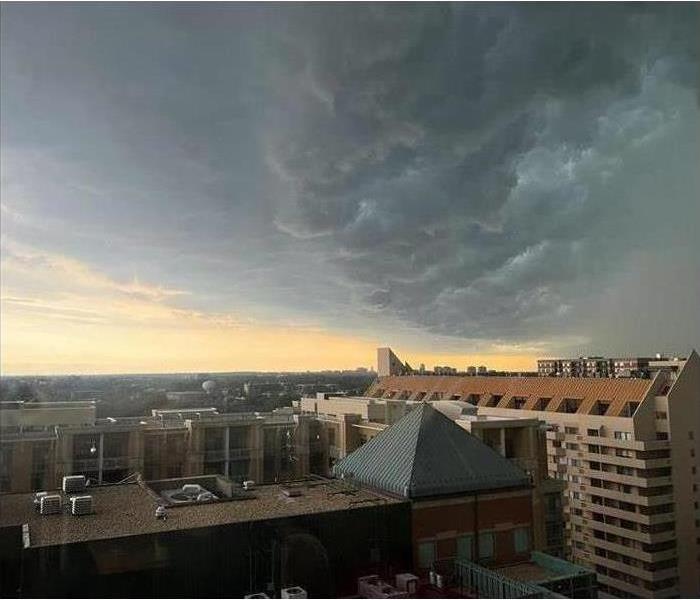 Blue sky and balmy weather are nice, but stay prepared for late-winter surprises!
Blue sky and balmy weather are nice, but stay prepared for late-winter surprises!
Freezing temps and snow one week, 50+ degrees the next!
That's weather in our DMV - DC, Maryland & Virginia! Balmy weather one day; frigid to near-freeze temperature overnight. To wear a sweater or not. To bring in the plants or not…
The weather can be unpredictable, as many of us here in the Washington, D.C.-Maryland region have experienced a time or two. Remember the heavy April snowfall over a decade ago? And the wind gusts of 20-30+ mph every now and then?
While we can’t predict when severe weather hits, we can always plan for those unexpected storms to minimize injury to ourselves and damages to our properties. A viable plan of action for storms, floods, tornadoes, even fires, can save lives and costly repairs in the aftermath of severe weather that can occur, even within the same day.
Mark Twain said it best: “In the spring I have counted one hundred and thirty-six kinds of weather inside of four and twenty hours.”
Preparing an emergency kit to keep on hand is a great start to advance planning for storms. Some items to include, as suggested by the Centers for Disease Control and Prevention, are:
- A battery-operated flashlight, a battery-operated NOAA Weather Radio, and extra batteries for both
- An emergency evacuation or shelter plan, including a map of your home and routes to safety from each room
- A list of important personal information, including:
- telephone numbers of neighbors, family and friends
- insurance and property information
- telephone numbers of utility companies
- medical information
- A 3–5 day supply of bottled water and nonperishable food
- Personal hygiene items
- Blankets or sleeping bags
- A first-aid kit, which may include:
- non-latex gloves
- assortment of adhesive bandages
- antibiotic ointment
- sterile gauze pads in assorted sizes
- absorbent compress dressings
- tweezers
- scissors
- adhesive cloth tape
- aspirin packets
Being prepared & proactive for storms and severe weather can save lives and minimize costly repairs to damaged property. Oftentimes we have little if any time to prepare for an approaching storm. For families with young children, a mock emergency drill may be a fun yet helpful activity. Show them where to go; where emergency supplies are stored; and make sure everyone in the family knows where & how to turn off the water, gas and electricity in your home.
Preparedness and swift response may save a life or two!
When all’s settled and you find your damaged properties needing cleanup & restoration, call us – SERVPRO Team Gutierrez of Laurel and Greenbelt NE Beltsville E at 301-323-8862.
We are the area’s water & storm damage restoration experts and are always “Faster to any size disaster.” Large or small, we will restore your water-damaged property, residential or commercial, with efficiency and detail.
What You Need to Know Before a Winter Storm
12/20/2024 (Permalink)
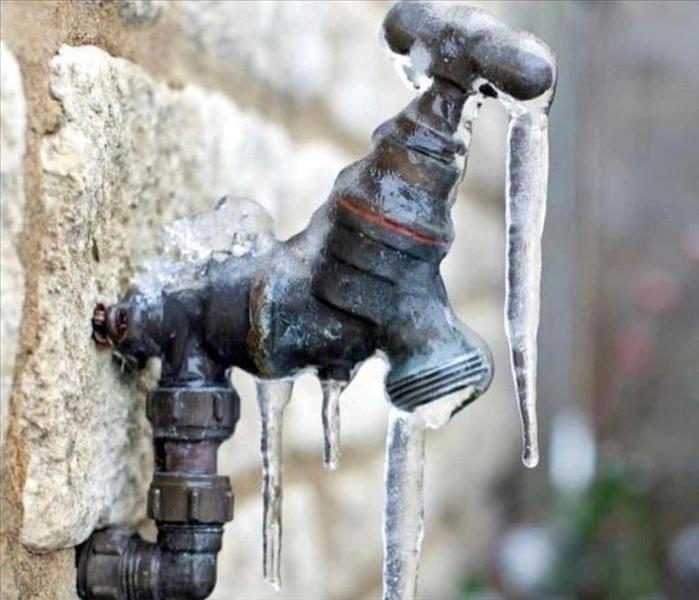 Follow these tips to prepare for a winter storm.
Follow these tips to prepare for a winter storm.
Winter is coming! And with winter comes icy storms that can cause a lot of damage! Not only is your home or business at risk, but also your health, the roads and your vehicle. Unlike storms occurring during the warmer seasons, winter storms can bring freezing rain, snow, ice, and intense, cold winds.
It’s important to make sure your home or office is properly insulated. Caulking and weather-stripping doors and windows will keep cold air from seeping into your property. Also consider installing a storm door. That will provide an extra layer of insulation and protection.
Also remember your pipes! To keep them from freezing, insulate them by wrapping them in old newspaper, for example. Then, cover the newspaper with plastic to keep any moisture out.
One of the most important things to keep in mind, especially during the coldest time of the year, is carbon monoxide. During a snowstorm in particular, it’s safe to assume your windows and doors are tightly shut. It’s great that snow and frigid air can’t make their way into your home, yet carbon monoxide can begin poisoning your air by quickly filling up the confined air.
Carbon monoxide can be released from the gas of generators, stoves and other equipment. Furthermore, having your car run to warm up for example, or sitting in it for heat purposes, will result in the release of carbon monoxide. If the vehicle is in an enclosed or poorly ventilated area, the buildup can be deadly. It’s odorless, silent and quick to poison.
Of course snowstorms also have a direct impact on the structure of your home. Heavy snow can cause your roof to weaken, possibly resulting in its collapse. Snowstorms can also cause windows to break.
Be careful of falling trees. Before cold temperatures set in, check your property for any dying trees or breaking branches. It’s a good idea to call a professional company if anything seems questionable. You will want to get any trees or branches removed that might put your property at risk.
Once the snow begins falling, its weight can easily snap a branch or even an entire tree that can land on your home or office, which in turn would create an opening for snow, rain, or ice to fall directly in your home.
Snowstorms can also affect your & others' health, including neighbors, homeless members of your community, and animals including pets. Health risks include hypothermia, heart attacks from overexertion, and frostbite. A common result of a winter storm is losing heat and communication services. Especially for the elderly and young children, losing heat can be life-threatening.
Additionally, if communication services are temporarily out and an emergency occurs, there is basically no way of getting help. As winter is quickly approaching, we encourage you to purchase a mobile phone from a reliable and trusted carrier if you currently only have a landline. We also encourage you to check on anyone you might see as at-risk.
If you know a winter storm is approaching, make sure to warn members of your community, such as an elderly neighbor, who may have not heard, or notify a local homeless shelter if you see someone you think would benefit from their services.
Lastly, make sure you are dressed warmly, covering yourself in winter gear from head to toe. Warm gloves and socks are essential as frostbite is most common on fingers and toes. You should stay indoors as much as possible and be sure to stay off the road. The road is an extremely dangerous place to be during a snowstorm. These weather conditions can make it nearly impossible to drive, and the last place you want to be is sitting on the side of a road as the snow on the ground grows higher.
Keep yourself safe and let’s keep everyone else safe and warm this winter!
In the unfortunate event you have pipe burst or other storm and water damage around your property, Team Gutierrez of SERVPRO of Laurel & Greenbelt NE/Beltsville E is here 24/7 to help.
Tips for returning to a flood-damaged home
5/28/2024 (Permalink)
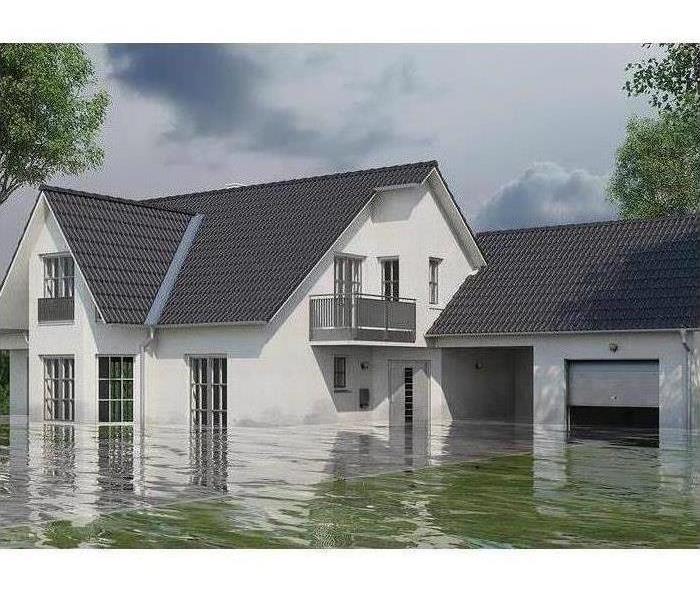 Beware that your house may be contaminated when returning home after a flood or other natural disasters.
Beware that your house may be contaminated when returning home after a flood or other natural disasters.
Water – one of life’s essentials, for without it, we simply cannot survive.
But flood and contaminated water – water from natural disasters, and from contaminated sources like sewage and overflowed toilets & such – are toxic and can cause numerous health hazards and diseases that can be fatal, if exposed.
With Spring in full swing and the Summer months just ahead, families will be vacationing and traveling away from home. Suppose there was a big storm with heavy flooding while you were away, and your home was flooded and you’ve returned to face standing water throughout the home.
It’s many homeowners’ worst nightmare. What to do?
For starters, the Centers for Disease and Control advises that, if possible, try to return home during the daytime so that you do not have to use any lights. Use battery-powered flashlights and lanterns, rather than candles, gas lanterns, or torches.
The agency also offers the following:
- If you have standing water in your home and can turn off the main power from a dry location, then go ahead and turn off the power, even if it delays cleaning. If you must enter standing water to access the main power switch, then call an electrician to turn it off. NEVER turn power on or off yourself or use an electric tool or appliance while standing in water.
- Have an electrician check the house’s electrical system before turning the power on again.
- If you smell gas or suspect a leak, turn off the main gas valve, open all windows, and leave your house immediately. Notify the gas company or the police or fire departments or State Fire Marshal’s office, and do not turn on the lights or do anything that could cause a spark. Do not return until you are told it is safe to do so.
- If the house has been closed up for several days, enter briefly to open doors and windows to let the house air out for a while (at least 30 minutes) before you stay for any length of time.
- If your home has been flooded and has been closed up for several days, assume your home has mold.
- If your home has been flooded, it also may be contaminated with sewage. Call a professional home inspector to check for contamination. If confirmed, have a licensed company remove & remediate mold and sewage. Our certified crews from SERVPRO of Laurel & SERVPRO of Greenbelt NE/Beltsville E are especially trained for such work, and are available 24/7 to help!
FOOD. The next step is to go through your home to discard perishable items and anything that has been contaminated with standing water. On top of that list is food; throw away food that may have come in contact with flood or storm water; perishable foods that have not been refrigerated properly due to power outages; and those with an unusual odor, color, or texture. Unsafe food can make you sick even if it looks, smells and tastes normal. When in doubt, throw it out!
WATER. Food water can contaminate drinking water from your home’s faucets. Until the water is tested, use bottled or water that has been properly boiled to kill any contaminants.
Some contaminants from surface water can get into the groundwater and affect private drinking water wells and municipal water systems that use groundwater. The CDC suggests the following steps:
- Follow local guidance on whether your water is safe to drink.
- If you have a private well and live in an area with flooding, get your water tested before you use it.
- Do not use water you suspect or have been told is contaminated to wash dishes, brush your teeth, wash and prepare food, wash your hands, make ice, or make baby formula. Safe water for drinking, cooking and personal hygiene includes bottled, boiled, or treated water.
- Your state, local, or tribal health department can make specific recommendations for boiling or treating water in your area.
Until your power is restored after dryout, use generators and other electrical sources and equipment safely. Talk to your utility company about using electrical equipment, including power generators. Be aware that it is against the law and a violation of electrical codes to connect generators to your home’s electrical circuits without the approved, automatic-interrupt devices. If a generator is on line when electrical service is restored, it can become a major fire hazard. In addition, the improper connection of a generator to your home’s electrical circuits may endanger line workers helping to restore power in your area.
- All electrical equipment and appliances must be completely dry before returning them to service. Have a certified electrician check these items if there is any question.
- Never use a generator, pressure washer, or any gasoline-powered engine inside your home, basement, or garage or less than 20 feet from any window, door, or vent.
The next step is to prevent MOLD from the flood or storm water, by drying out your home. Follow these steps from the CDC:
- If you have electricity and an electrician has determined that it’s safe to turn it on, use a “wet-dry” shop vacuum (or the vacuum function of a carpet steam cleaner), an electric-powered water transfer pump, or sump pump to remove standing water. If you are operating equipment in wet areas, be sure to wear rubber boots.
- If you do not have electricity, or it is not safe to turn it on, you can use a portable generator to power equipment to remove standing water. Note: If you must use a gasoline-powered pump, generator, pressure washer, or any other gasoline-powered tools to clean your home, never operate the gasoline engine inside a home, basement, garage, carport, porch, or other enclosed or partially enclosed structures, or less than 20 feet from any door, window, or vent, even if the windows and doors are open. Such improper use can create dangerously high levels of carbon monoxide and cause carbon monoxide poisoning.
- If weather permits, open windows and doors of the house to aid in the drying-out process.
- Use fans and dehumidifiers to remove excess moisture. Fans should be placed at a window or door to blow the air outwards rather than inwards, so not to spread the mold.
- Have your home heating, ventilating, and air-conditioning (HVAC) system checked and cleaned by a maintenance or service professional who is experienced in mold cleanup before you turn it on. If the HVAC system was flooded with water, turning on the mold-contaminated HVAC will spread mold throughout the house. Professional cleaning will kill the mold and prevent later mold growth. When the service determines that your system is clean and if it is safe to do so, you can turn it on and use it to help remove excess moisture from your home.
- Prevent water outdoors from reentering your home. For example, rainwater from gutters or the roof should drain away from the house; the ground around the house should slope away from the house to keep basements and crawl spaces dry.
- Ensure that crawl spaces in basements have proper drainage to limit water seepage. Ventilate to allow the area to dry out.
The CDC and the American Red Cross offer great resources for storm and fire prevention and response. Visit their webpages for more information:
www.cdc.gov/floods/about/?CDC_AAref_Val=https://www.cdc.gov/disasters/floods
www.redcross.org/get-help/how-to-prepare-for-emergencies/types-of-emergencies/flood
Finally, when you are ready for that monstrous task of cleanup and remediation, you can rely on SERVPRO of Laurel and SERVPRO of Greenbelt NE/Beltsville E. We are the area’s water & storm damage experts, as well as mold remediation and restoration. Large or small, we will restore your water-damaged property, residential or commercial, with efficiency and detail.
Call us 24/7 at 301-323-8862 or 301-340-1313.
Tips on how to recover flood-damaged items
5/28/2024 (Permalink)
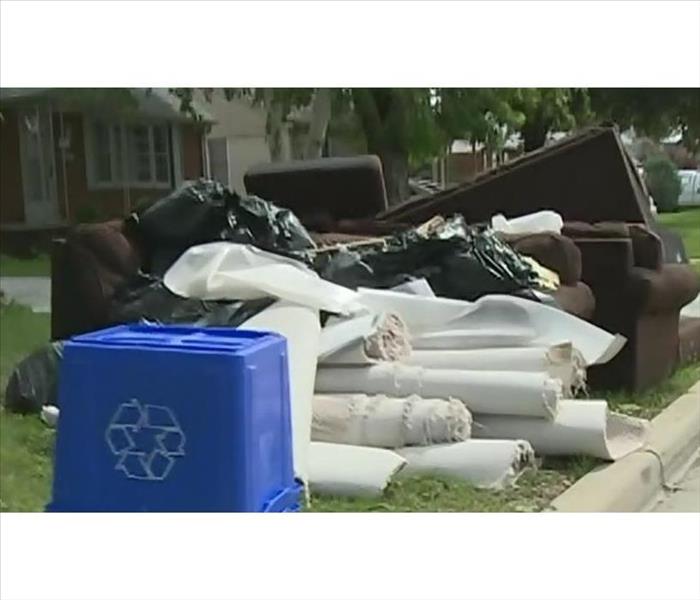 Follow these tips to help dry out your flood-damaged items quickly.
Follow these tips to help dry out your flood-damaged items quickly.
If you’ve ever experienced a house flood, you might have lost a few items, or maybe you lost most of your possessions depending on the extent of the waters and how long you waited to dry your furnishings, accessories and trinkets.
If you want to salvage your goods after experiencing a flooding, it’s essential to dry items within a 48-hour time frame.
We offer some tips to help save your items:
- Improve air circulation! Don’t contain the moisture. Instead, open windows and doors. If there are no windows or doors leading outside in the particular room, open closet and cabinet doors.
- Turn on a fan! It can either be a ceiling fan, a floor fan, or both. However, please do not plug a fan into an outlet attached to a wall that is wet or has water behind it. That’s an easy way to get electrocuted.
- Use a dehumidifier. These remove water vapor from the air. To be effective, it must be used in a contained area. Be sure to shut all doors and windows during use to prohibit more humidity from entering.
- Use a sump pump. These remove water out of house or office through a hose or pipe. They’re useful when the floodwater level is more than a couple inches deep.
- Got soaked items? Quickly take them out of your house and allow them to dry off in the sun. Keeping them indoors will ensure nothing ever dries up as their excessive moisture will travel to surrounding objects.
- Try a wet-dry shop vacuum. Never use a regular vacuum cleaner. A shop vac is specifically made for wet conditions.
At SERVPRO of Laurel and SERVPRO of Greenbelt NE/Beltsville E, we are water damage cleanup & restoration experts. With well-trained technicians and the latest state-of-the-art equipment, you can trust us to clean up and restore your property "Like it never even happened."
Give SERVPRO Team Gutierrez of Laurel, Greenbelt & Beltsville a call today at 301-323-8862 if you have any questions or need water damage restoration. We are open 24/7 and here to help!
Be Prepared for Those Unpredictable Spring & Summer Storms
5/3/2024 (Permalink)
 Spring & Summer storms can occur anytime. Be prepared!
Spring & Summer storms can occur anytime. Be prepared!
SERVPRO® of Laurel and SERVPRO of Greenbelt NE/Beltsville E want you to be ready for summer storms. While we hope that summer just consists of vacations and sunny days, that is not always the case.
Spring or summer storms happen quite often in Maryland including Prince George's County. There are many possibilities of damage from storms, whether from wind, heavy rain, or lightning. Wind can cause structural damage to your home, heavy rain can lead to flooding and if lightning strikes on your property, it is at risk of a fire.
If you know a storm is coming, take these initiatives to ensure safety:
- Secure outdoor objects that could blow away or cause damage.
- Shutter windows and secure outside doors.
- Unplug any electronic equipment.
During the storm, remain calm and be aware.
- Use your battery-operated NOAA Weather Radio for updates from local officials.
- Avoid contact with cords.
- Stay away from windows and doors.
After the Storm, BE SAFE! It may not be storming anymore but the damage can still affect you.
- Never drive through a flooded roadway.
- Stay away from storm-damaged areas to keep from putting yourself at risk.
- Stay away from downed power lines and report them immediately to 911.
If you're caught off-guard to a dangerous storm that causes property damage, don’t stress, we have Emergency Response Teams 24/7 who are specially-trained to deal with the mess of a storm. Let us be the experts you need in your time of crisis. Give SERVPRO Team Gutierrez a call at 301-323-8862.
Now is the time to prepare for a ‘turbulent’ 2024 Hurricane Season!
5/3/2024 (Permalink)
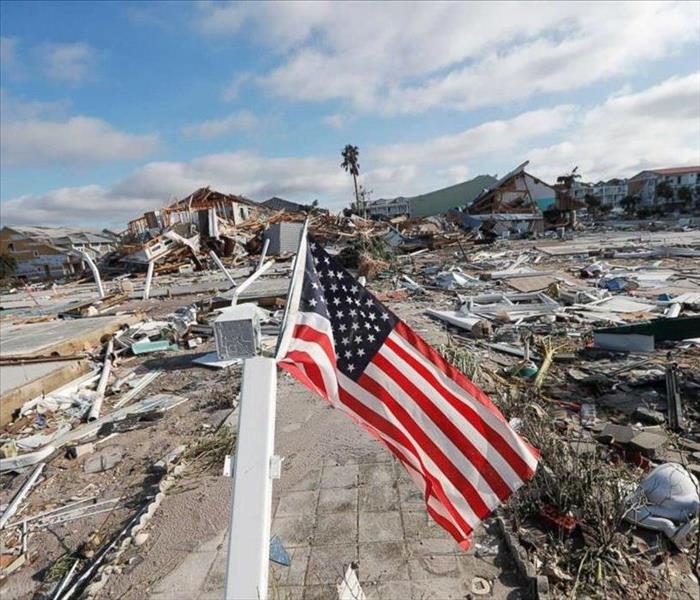 Weather forecasters are predicting a turbulent 2024 hurricane season. Prepare your family & property to stay safe and for quick response!
Weather forecasters are predicting a turbulent 2024 hurricane season. Prepare your family & property to stay safe and for quick response!
Meteorologists are predicting 2024 to be one of the most turbulent hurricane seasons on record, with 24 named storms and 11 hurricanes forecasted. Six of those hurricanes are predicted to reach Category 3 status or stronger.
“The 2024 Atlantic hurricane season is forecast to feature well above the historical average number of tropical storms, hurricanes, major hurricanes and direct U.S. impacts," AccuWeather Lead Hurricane Forecaster Alex DaSilva said in an accuweather.com article.
Jonathan Belles, a graphics meteorologist and writer for weather.com, wrote that bigger impact from the hurricanes is likely this year. “Forecasters are also worried about more landfalls this season due to a troubling setup for storm movement,” he wrote.
Unlike last season, “a stronger high-pressure system is expected to set up shop near Bermuda and the Azores, which should deflect more storms westward toward the Caribbean and the United States,” Belles wrote.
As a restoration company – SERVPRO® Team Gutierrez of Laurel & Greenbelt NE/Beltsville E, as well as our flagship franchises in Montgomery County, SERVPRO of Rockville-Olney & Silver Spring North – is always prepared for disasters, and especially Hurricane Season that begins June 1 and ends November 30.
Now is a good time to prepare your family and your property to help keep you safe & minimize response time. The American Red Cross offers these Hurricane Safety tips:
Plan to Evacuate
- If advised to evacuate, do so immediately and go to a safe place.
- Know where you will go, how you will get there, and where you will stay.
- Plan well in advance if you will need help leaving or use public transportation.
- Mobile & trailer homes and recreational vehicles (RVs) cannot provide safe shelter from tropical-storm or hurricane-force winds.
Plan to Shelter Safely
- Be ready to live without power, water, gas, phone, and internet for a long time.
- Practice going to a designated safe shelter for high winds. The next best protection is a small, interior, windowless room in a sturdy building on the lowest level that is not likely to flood.
- If you are in an area that is likely to flood, designate a location on higher ground that you can move to before floodwaters reach you.
Storm & water damage in your property can cause further damage if not mitigated swiftly and properly. That’s why our SERVPRO emergency response teams are on call 24/7 to help.
We have trained & experienced manpower, state-of-the-art equipment, and tried-and-true method to restore your property to preloss condition, “Like it never even happened.” Give us a call and see why our SERVPRO brand has been consistently ranked #1 by Entrepreneur magazine in the restoration services category for 22 years. 301-323-8862.
Spring is nice, but be prepared for those unexpected storms!
4/11/2024 (Permalink)
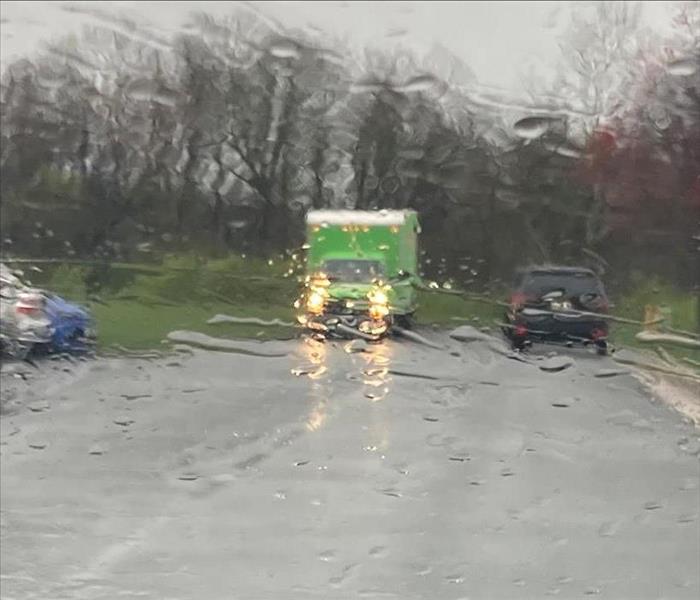 Get the home and yard ready for those unexpected storms!
Get the home and yard ready for those unexpected storms!
Ahhh! Spring… Balmy weather one day; frigid to near-freeze temperature overnight. To wear a sweater or not. To bring in the plants or not…
Spring weather can be unpredictable, as many of us here in the Washington, D.C. region have experienced a time or two. Remember the heavy April snowfall over a decade ago? And the wind gusts of 20-30+ mph every now and then, like the one our DMV experienced just over the weekend in late March.
While we can’t predict when severe weather hits, we can always plan for those unexpected storms to minimize injury to ourselves and damages to our properties. A viable plan of action for storms, floods, tornadoes, even fires, can save lives and costly repairs in the aftermath of severe weather that can occur, even within the same day.
Mark Twain said it best: “In the spring I have counted one hundred and thirty-six kinds of weather inside of four and twenty hours.”
Preparing an emergency kit to keep on hand is a great start to advance planning for storms. Some items to include, as suggested by the Centers for Disease Control and Prevention, are:
- A battery-operated flashlight, a battery-operated NOAA Weather Radio, and extra batteries for both
- An emergency evacuation or shelter plan, including a map of your home and routes to safety from each room
- A list of important personal information, including:
- telephone numbers of neighbors, family and friends
- insurance and property information
- telephone numbers of utility companies
- medical information
- A 3–5 day supply of bottled water and nonperishable food
- Personal hygiene items
- Blankets or sleeping bags
- A first-aid kit, which may include:
- non-latex gloves
- assortment of adhesive bandages
- antibiotic ointment
- sterile gauze pads in assorted sizes
- absorbent compress dressings
- tweezers
- scissors
- adhesive cloth tape
- aspirin packets
Being prepared & proactive for storms and severe weather can save lives and minimize costly repairs to damaged property. Oftentimes we have little if any time to prepare for an approaching storm. For families with young children, a mock emergency drill may be a fun yet helpful activity. Show them where to go; where emergency supplies are stored; and make sure everyone in the family knows where & how to turn off the water, gas and electricity in your home.
Preparedness and swift response may save a life or two!
When all’s settled and you find your damaged properties needing cleanup & restoration, call us – SERVPRO® of Laurel and SERVPRO of Greenbelt NE/Beltsville E – 24/7 at 301-323-8862 or 301-615-4884.
We are the area’s water & storm damage experts and are always “Faster to any size disaster.” Large or small, we will restore your water-damaged property, residential or commercial, with efficiency and detail.
Large or Small, We Can Tackle Any Size Disaster
3/13/2024 (Permalink)
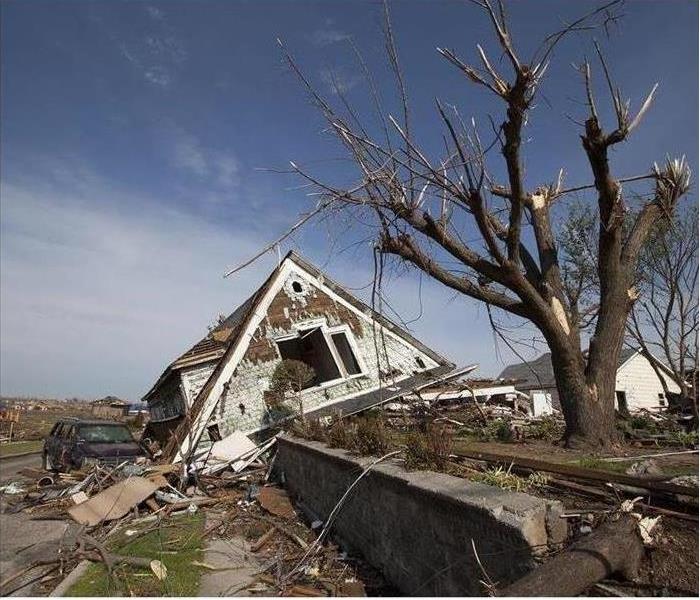 Large or small, here in PGC or out of state, our local SERVPRO of Laurel & Greenbelt-Beltsville franchises can handle any size disaster.
Large or small, here in PGC or out of state, our local SERVPRO of Laurel & Greenbelt-Beltsville franchises can handle any size disaster.
Spring 2024 is well under way as residents in the Maryland, Virginia and DC region are enjoying the longer days and warmer weather.
And if you live in the area long enough, you know well the unexpected change in weather in any season. Yes, we're alluding to storms, those unpredictable springtime and summertime storms that usually bring with them high winds and heavy rains.
Large or small, here in Prince George's County or beyond, our local SERVPRO of Laurel & SERVPRO of Greenbelt NE/Beltsville E franchises are equipped with resources and manpower to tackle any size disaster. It's one of the reasons our storm and emergency response teams are regularly trained and certified to be ready for such disasters, because time is of the essence when disasters strike, and it’s especially so for the people affected as well as other responders such as insurance companies.
Quick restoration means home & business owners can reclaim their properties and start to pick up the pieces sooner; for insurance adjusters, it means less claim payout since longer restoration time can mean insurance companies have to put their insureds into temporary housing and such. It’s a win for all involved!
But storm response also means that our crews perform their jobs with the care and compassion our customers need, especially at times of distress and uncertainty. The nature of our business as fire & water cleanup and restoration companies is such that we may be imposing on personal properties and belongings that are of great monetary & sentimental value to our customers.
SERVPRO of Laurel & SERVPRO of Greenbelt NE/Beltsville E, along with our parent franchises SERVPRO of Rockville-Olney & Silver Spring North, is a full-service restoration company that specializes in the cleanup, restoration & reconstruction of residential and commercial properties after a fire, smoke or water damage. We also mitigate mold and mildew, and biohazards from your home or business, as well as thorough cleaning with CDC-certified products.
For a free consultation, call us 24/7 at 301-323-8862 or 301-340-1313. We are always here to help!
Spring is a Good Time to Plan for Summer Storms!
3/12/2024 (Permalink)
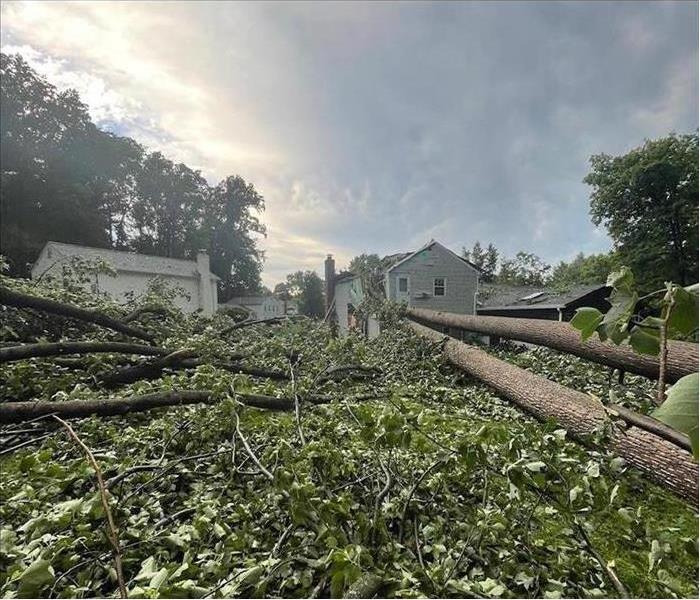 Spring is near and a great time to prepare for those unpredictable summer storms!
Spring is near and a great time to prepare for those unpredictable summer storms!
Spring is just a week away in the DMV with warmer weather and cherry blossoms in full glory, but here at SERVPRO® of Laurel and Greenbelt NE/Beltsville E, we want you to be ready for summer storms.
While we hope that summer consists only of vacations and sunny days, unfortunately that is not always the case. A summer storm happens quite often in Maryland. There are many possibilities of damage from summer storms, whether that is wind, heavy rain, thunder or lightning. Wind causes constructional damage to your home, while heavy rain can lead to flooding and if lightning strikes on your home or business, it is at risk of a fire.
If you know a storm is coming, think ahead & take these initiatives to ensure safety:
- Secure outdoor objects that could blow away or cause damage.
- Shutter windows and secure outside doors.
- Unplug any electronic equipment.
During the storm, remain calm and be aware.
- Use your battery-operated NOAA Weather Radio for updates from local officials.
- Avoid contact with cords.
- Stay away from windows and doors.
After the Storm, BE SAFE! It may not be storming anymore but the damage can still affect you.
- Never drive through a flooded roadway.
- Stay away from storm-damaged areas to keep from putting yourself at risk.
- Stay away from downed power lines and report them immediately to 911.
If you are caught off-guard to a dangerous storm during the night, don’t stress. We are a 24-Hour Emergency Service and we will make your storm-damaged home look “Like it never even happened.” Our team is specially-trained to deal with the mess of a storm. Let us be the experts that you need in your time of crisis.
Call SERVPRO® Team Gutierrez 24/7 at 301-323-8862 or 301-615-4884. We are here to help!
Disasters call for swift response & efficient service!
3/7/2024 (Permalink)
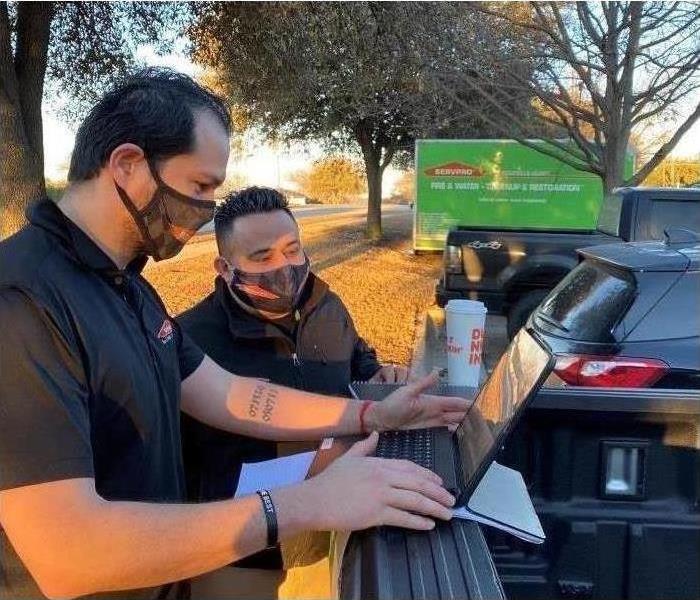 SERVPRO Team Gutierrez members go over the day's jobs.
SERVPRO Team Gutierrez members go over the day's jobs.
It was this time in 2021 when Texas and surrounding southern states experienced an unprecedented disaster when the Polar Vortex brought freezing weather and historic damage such as pipe bursts and other water-related disasters to the local homes & businesses there.
But unprecedented disasters call for unprecedented response. Which is exactly what SERVPRO® of Laurel & Greenbelt NE-Beltsville E, and our parent franchises SERVPRO of Rockville-Olney did! Our crews from the Maryland franchises swiftly prepared, packed up and departed for Dallas, Texas to lend a hand to the massive cleanup and restoration efforts in the wake of the historic snow storms that devastated hundreds of lives and damaged thousands and thousands of homes and businesses throughout numerous southern U.S. states. Our local teams left for Plano, a suburb of Dallas, on in mid-February morning and arrived well over the estimated 24-hour trip due to treacherous road conditions in many stretches of highways.
Extreme cold weather, especially in states that aren't usually prepared for such conditions, commonly cause frozen pipes that result in water damage. In Texas, for example, the temperatures in many cities dipped below 20 degrees F the weekend of Feb. 13, 2021 when many celebrated Lunar New Year and Valentine's Day. Both indoor & outdoor pipes in thousands of homes froze due to improper insulation. The water damage can be extensive, as most homes in the south have attics and not basements, causing water to trickle down from the top and wreak havoc to ceilings and walls in addition to floorings, furniture and other household items.
Other areas in the homes where pipes are unheated or partially heated that are also at risk of freezing include crawl spaces and garages. State of emergency has been declared in the affected southern states, making it easier for residents to apply for federal aid to help pay for losses, repairs and other areas including salary loss due to inability to get to work. Insurance companies also are making it easier for policy holders to file claims, and restoration companies like SERVPRO also are doing what they can to make it easier for customers to file insurance claims, by making electronic claim forms easily available as part of their response process.
Another potential hazard to consider as the snow/ice begins to melt is damage to your roof and ice dams. An ice dam is formed when snow melts unevenly on a roof and refreezes into a dam at the edge of the roof, near the eaves. This dam prevents any further snowmelt from draining off of the roof. This standing water can back up under shingles, leak into a home, and cause significant water damage to ceilings, walls, and other areas. Ice dams can also tear off gutters and loosen shingles.
Snow and ice can cause significant damage to your gutters and roof. The additional weight of snow and ice can even cause a roof to collapse. When there’s a cold snap, water can get into cracks and small spaces and expand when it freezes, causing larger cracks and more damage. The repetition of freezing and thawing cycles can cause small cracks to get larger.
Natural disasters can strike at any time. Best to be prepared, and be sure to keep our SERVPRO Team Gutierrez's number handy for quick response. 301-323-8862.
Winter weather is coming. Are you prepared?
12/28/2023 (Permalink)
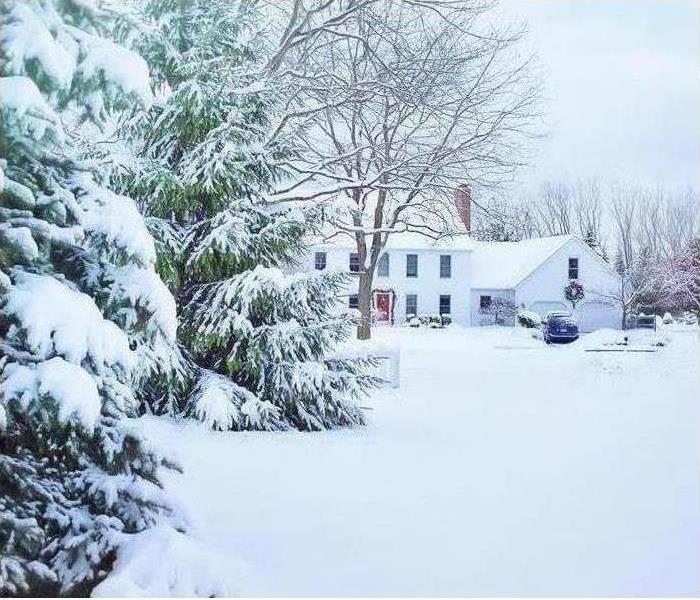 Follow these tips to winter-proof your property to prepare for cold weather.
Follow these tips to winter-proof your property to prepare for cold weather.
Winter 2023-24 is under way, reminding us that it's that time of year to winter-proof our homes.
If you live in Maryland and haven’t already, now is the perfect time to take advantage of the warmer days in order to get your property ready for the colder weather coming our way.
Below are a few tips for keeping your property at its peak during the Winter season:
- Seal gaps around door frames and windows to keep cold air from slipping in
- Insulate pipes and hot water tanks to avoid freezing and to reduce heat loss
- Check your drainage. To avoid saturation, and then the thawing of the soil near your property’s structure, add extra soil to the affected area.
- Clean your gutters to avoid a backup and potential overflow.
- Clean your chimney! Before you begin using the fireplace, have it inspected and cleaned, or else, many problems can arise.
- Test smoke and carbon monoxide detectors, and make sure they work properly. House fires most commonly occur in the winter months. While homes and offices are closed up tight during the winter to keep the cold air out, it also means carbon monoxide becomes more of a hazard.
- Drain any outdoor faucets
- These faucets can develop a costly leak
- Faucets can also freeze over, sometimes splitting the water line, which can lead to a house flooding
- Cover outdoor furniture to avoid damage from snow, hail, etc., but do so on a nice, dry day, so no moisture can become trapped under whatever you cover your furniture with.
- Find your shovel or snow blower ahead of time. One of the last things you want to do in a snowstorm is crawl your way through piles of snow to your shed to retrieve such items.
- Check your trees. Is there any risk it could fall on your home or building? Could one of its dead branches? Is a branch touching your property? If so, it’s a good time to chop off whatever necessary before snow and ice come
- Check your attic
- Heats rises, so if you don’t insulate your attic well, the heat you’re paying for will rise right out of your home.
- Check for critters! Animals want a warm place to stay during wintertime. Just make sure it’s not in your attic or home in general!
Keep our SERVPRO of Laurel & Greenbelt NE/Beltsville E number handy in the event you have storm or water damage in your home or business during Winter. 301-323-8862. We have Emergency Response Teams stand ready to help.
How to Prevent Ice Dams Around Your Property
12/14/2022 (Permalink)
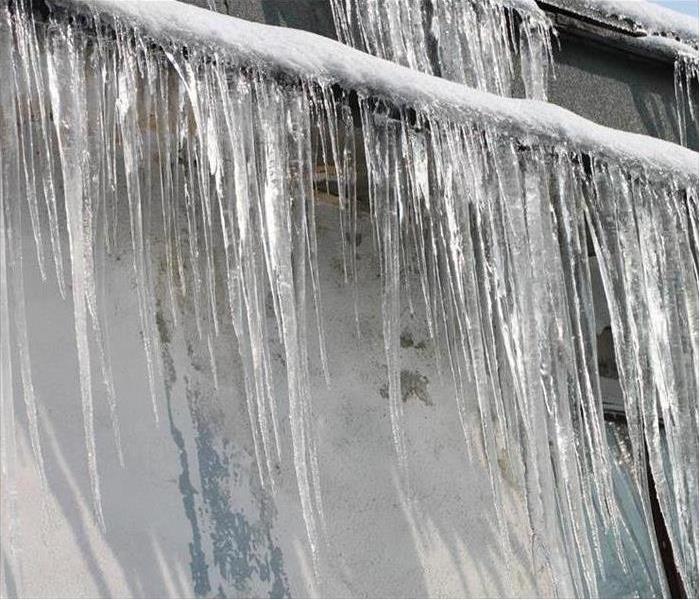 It's important to act immediately after spotting an ice dam on your property to prevent further damage!
It's important to act immediately after spotting an ice dam on your property to prevent further damage!
You can take numerous actions to prevent an ice dam from forming on your property both before and after a snowfall. Whether you are concerned about a dam forming on your home or one forming on your building, you can follow these useful tips in order to prevent a catastrophe:
To stop an ice dam:
Keep your attic insulated
Improve ventilation, especially in the eaves and ridge
Prevent air leaks. Caulk any gaps or openings
Install an extra barrier under the shingles to prevent water from seeping into home or building
Seal and insulate ducts
Cold temperatures can sometimes have their way of forming a dam on your property despite following these tips. Be sure to:
Clear snow from roof after every snow shower
Clear gutters of any leaves, snow or debris
Clear around downspouts, too
However, your safety is your first priority! Snowy and icy conditions make everything more slippery and dangerous. Do not use a ladder or attempt climbing, as you could slide off the surface or the ladder. If you find it unsafe to remove an ice dam you spot on your property, for example, call a professional immediately!
Give us a call at SERVPRO of Laurel and Greenbelt NE/Beltsville E today if you have any questions or storm & water damage restoration needs. 301-323-8862.
Be ready for Hurricane Season!
5/6/2022 (Permalink)
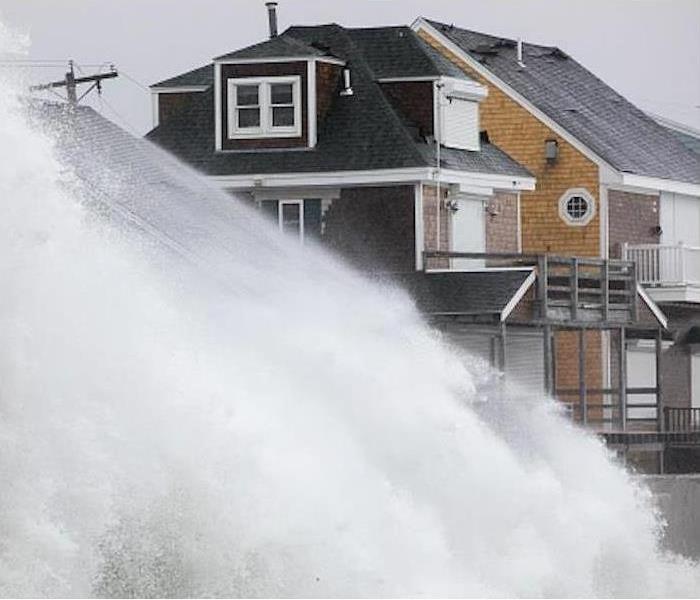 Let us set up a SERVPRO Emergency Ready Plan, or ERP, for you, so you can be ready for hurricane season & those unexpected storms.
Let us set up a SERVPRO Emergency Ready Plan, or ERP, for you, so you can be ready for hurricane season & those unexpected storms.
Hurricane Season 2022 starts June 1. Are you prepared for a big storm? Now is a good time to have a plan – a SERVPRO Ready Plan – in the event of an unexpected natural disaster!
The National Oceanic and Atmospheric Administration this week predicts "above-normal" activity again, calling for warmer than normal sea surface temperatures in the subtropical Atlantic and Caribbean Sea. Experts are predicting 13 to 20 named storms (winds of 39 mph or higher), 6 to 10 of those could reach hurricane strength with winds of 74 mph+, including 3 to 5 Category 3-5 major hurricanes with winds of 111 mph or higher. The Atlantic hurricane season runs through Nov. 30.
The SERVPRO Emergency Ready Plan, or ERP, is a FREE tool for property managers, risk managers and owners, both residential and commercial. It allows the user to create an emergency ready profile of their facility containing critical information to help speed up response time after fire or water damage. Help is then just a few clicks away.
Contact SERVPRO of Laurel and Greenbelt NE/Beltsville E at 301-323-8862 or 301-615-4884 today so we can help you prepare your free ERP assessment!
It's never too early to prepare for Autumn storms!
3/31/2022 (Permalink)
 We can help prepare and protect your property this fall, as well as emergency cleanup & restoration of your water damage property.
We can help prepare and protect your property this fall, as well as emergency cleanup & restoration of your water damage property.
If you have experienced storm damages to your property and had one of our SERVPRO of Laurel teams in your home or business for cleanup & restoration, then you know that we are good at what we do because we are always prepared.
We offer blogs on how to prepare for those sudden spring and summer storms on this site. Following the spirit of thinking ahead and early preparedness, we'd like to offer our customers some insight into Autumn storms.
As the heat of summer comes to an end, the humidity often mixes with the drier air of Autumn that’s on its way in. The encounter results in an increase of thunderstorms.
Gusty winds, heavy rainfall and lightning are among the most common characteristics of a thunderstorm. When a thunderstorm updraft has enough strength to carry water to an area with below-freezing temperatures, hailstones begin to form. When the hailstones become too heavy for the updraft to hold, they are released, and that is when hail falls to the ground.
Damages caused by the winds, rainfall, lightning and hail can have devastating effects on your property.
Post-storm damages are not limited to, but can certainly include water, fire, and even mold damages.
In the unfortunate event you've experienced any storm/water-related problems, either residential or commercial, SERVPRO of Laurel and SERVPRO of Greenbelt NE/Beltsville E will get you back on your feet fast with our extensive knowledge and quick emergency response.
We can help prepare and protect your property this fall! 301-323-8862 or 301-615-4884.
Learn more about spring & summer storms in Maryland
3/30/2021 (Permalink)
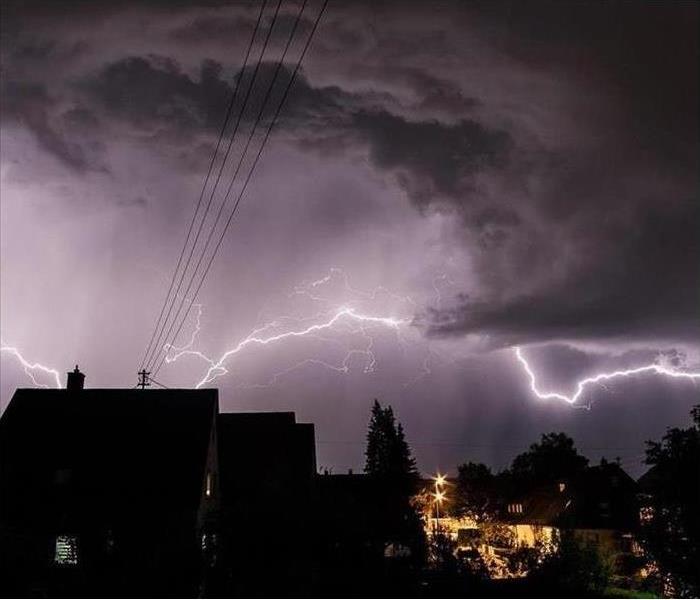 Prepare your home before a storm to minimize damages.
Prepare your home before a storm to minimize damages.
While Spring & Summer seasons here in Maryland bring lots of sunshine and pleasant warm weather, they also give us a fair share of storms. The area often experiences thunderstorms that usually brings with them heavy rains and strong winds, causing trees and powerlines to fall. Lightning, thunder, flying debris and hail can also occur during these storms.
Our emergency services team at SERVPRO of Laurel and SERVPRO of Greenbelt NE/Beltsville E frequently respond to trees that down onto roofs, windows and nearby structures at both residential and commercial communities. One of the first steps our teams take is placing tarps over the affected areas to prevent further damage to the home/building. This emergency tarping prevents other elements, such as rain and dust, from entering inside the cracks and openings of the roof, window, siding, etc... that fallen trees and other debris may have caused.
Here are a few tips to make your property more secure during a storm:
- Get your roof and foundation checked out! Are there any cracks in your roof? If so, call a professional to have it repaired ASAP.
- Remove any tree branches that pose risk to breaking a window, for example. Getting a tree trimming before the Spring & Summer storm seasons begin is a wise idea.
- Invest in storm windows.
- Bring all patio furniture, grills, etc. indoors before the storm hits.
- Tightly secure outdoor items you cannot bring indoors.
- Have a favorite potted plant? You will want to bring that inside until the storm passes over, too.
- If you have a garage, park your vehicle inside it before the storm hits.
- If you must evacuate due to the storm, secure and board up windows.
We hope you find these tips helpful and wish you an enjoyable and safe Spring & Summer!
Follow us on Facebook to learn more tips and company news & updates: SERVPRO-of-Laurel-Beltsville-Greenbelt






 24/7 Emergency Service
24/7 Emergency Service














